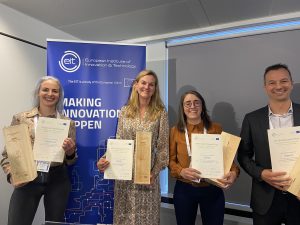The future is circular and Europe is leading the way
“An event on the future of circular economy could not have come on a better week” noted Emmanuelle Maire, Head of Sustainable Production & Consumption at the European Commission DG Environment. And she was right – on Wednesday 30 November, the European Commission‘s proposed new EU-wide rules on packaging to tackle growing waste and consumer frustration with confusing packaging information. The new proposal includes targets for packaging waste reduction in Member States and mandatory reuse or refill targets in sectors such as retail and catering.
So as the EIT Circular Economy Community gathered on Thursday 1 December in EIT House to celebrate the year, both with those in Brussels and the community online, and look ahead to what’s next, the proposals from the Commission felt like a welcome boost to the work already being done across Europe to accelerate circular economy.
To begin the day, we heard from Manuel Irun Molina, Head of Grants & Implementation Unit at EIT, who highlighted the importance of having cross-sector support and work on this topic to ensure its success: “The EIT Community on Circular Economy is a strategic initiative for the EIT, as it allows for systemic action cutting across the sectors of agri-food, raw materials, manufacturing and urban mobility “.
Emmanuelle Maire then gave us an extensive overview of the importance of the legislation proposed this week and the impact it could have on every citizen in Europe. “As it stands, every citizen in Europe throws away 180kg of waste a year which breaks down to 0.5 kg a day”, she noted, bringing home the reality of a waste-heavy society. Emmanuelle highlighted how legislation can support, rather than hinder, the industry by introducing easy to understand rules around packaging and advertising and how this will pave the way for more circular initiatives. Ignacio Calleja, Senior Advisor on Circular Economy at EIT Raw Materials walked the room through the activities of the cross-KIC community over the past few years and pointed to the future. What was apparent is that the circular economy is growing, and collaboration and partnerships will allow activities to be more impactful.
And finally, we heard from the four winners of the EIT Circular Community Prize 2022 – all of which are companies responding to the problems associated with waste in society and proposing innovative ways to create circular activities across diverse sectors.

The Circular Prize Winners for 2022
We heard from kheoos, an e-commerce platform to enable full-scale, efficient and transparent worldwide market for spare parts. Longtime from Ethikis is a product label that gives consumers the reassurance that a product is durable and long-lasting, helping to support their choices when it comes to appliances. ParaStruct walked us through their advanced 3D power-printing technology that enables the recycling of construction waste into high-quality materials for re-use. And to finish off the pitching session, Niaga walked us through their Digital Product Passport which enables consumers to see exactly what products are made of and crucially, how to effectively recycle them.
In the afternoon, the EIT Community on Circular Economy hosted a co-creation workshop with the invited stakeholders from the European Commission, the EU Research Executive Agency, the European Investment Bank, the Club of Rome – EU Chapter and industry representatives from the EIT Community ecosystem. The objective of the workshop was to map the stakeholders’ strategies to accelerate the transition towards circular economy and opportunities to overcome systemic challenges through the EIT approach based on Innovation, support to Business Creation and Entrepreneurial Education.
Hearing from industry, policy and interested stakeholders brought home the incredible breadth of opportunities available in the circular economy sphere and the importance of making connections between these projects to learn from and between them. What is needed now is the legislation and funding to expand these ideas across the continent and truly make Europe a leader in the circular economy sphere.

